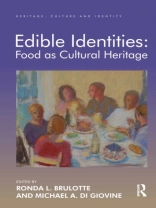Food – its cultivation, preparation and communal consumption – has long been considered a form of cultural heritage. A dynamic, living product, food creates social bonds as it simultaneously marks off and maintains cultural difference. In bringing together anthropologists, historians and other scholars of food and heritage, this volume closely examines the ways in which the cultivation, preparation, and consumption of food is used to create identity claims of ”cultural heritage” on local, regional, national and international scales. Contributors explore a range of themes, including how food is used to mark insiders and outsiders within an ethnic group; how the same food”s meanings change within a particular society based on class, gender or taste; and how traditions are ”invented” for the revitalization of a community during periods of cultural pressure. Featuring case studies from Europe, Asia and the Americas, this timely volume also addresses the complex processes of classifying, designating, and valorizing food as ”terroir, ” ”slow food, ” or as intangible cultural heritage through UNESCO. By effectively analyzing food and foodways through the perspectives of critical heritage studies, this collection productively brings two overlapping but frequently separate theoretical frameworks into conversation.
Ronda L. Brulotte & Michael A. Di Giovine
Edible Identities: Food as Cultural Heritage [EPUB ebook]
Edible Identities: Food as Cultural Heritage [EPUB ebook]
购买此电子书可免费获赠一本!
格式 EPUB ● 网页 252 ● ISBN 9781317145981 ● 编辑 Ronda L. Brulotte & Michael A. Di Giovine ● 出版者 Taylor and Francis ● 发布时间 2016 ● 下载 3 时 ● 货币 EUR ● ID 4890117 ● 复制保护 Adobe DRM
需要具备DRM功能的电子书阅读器












